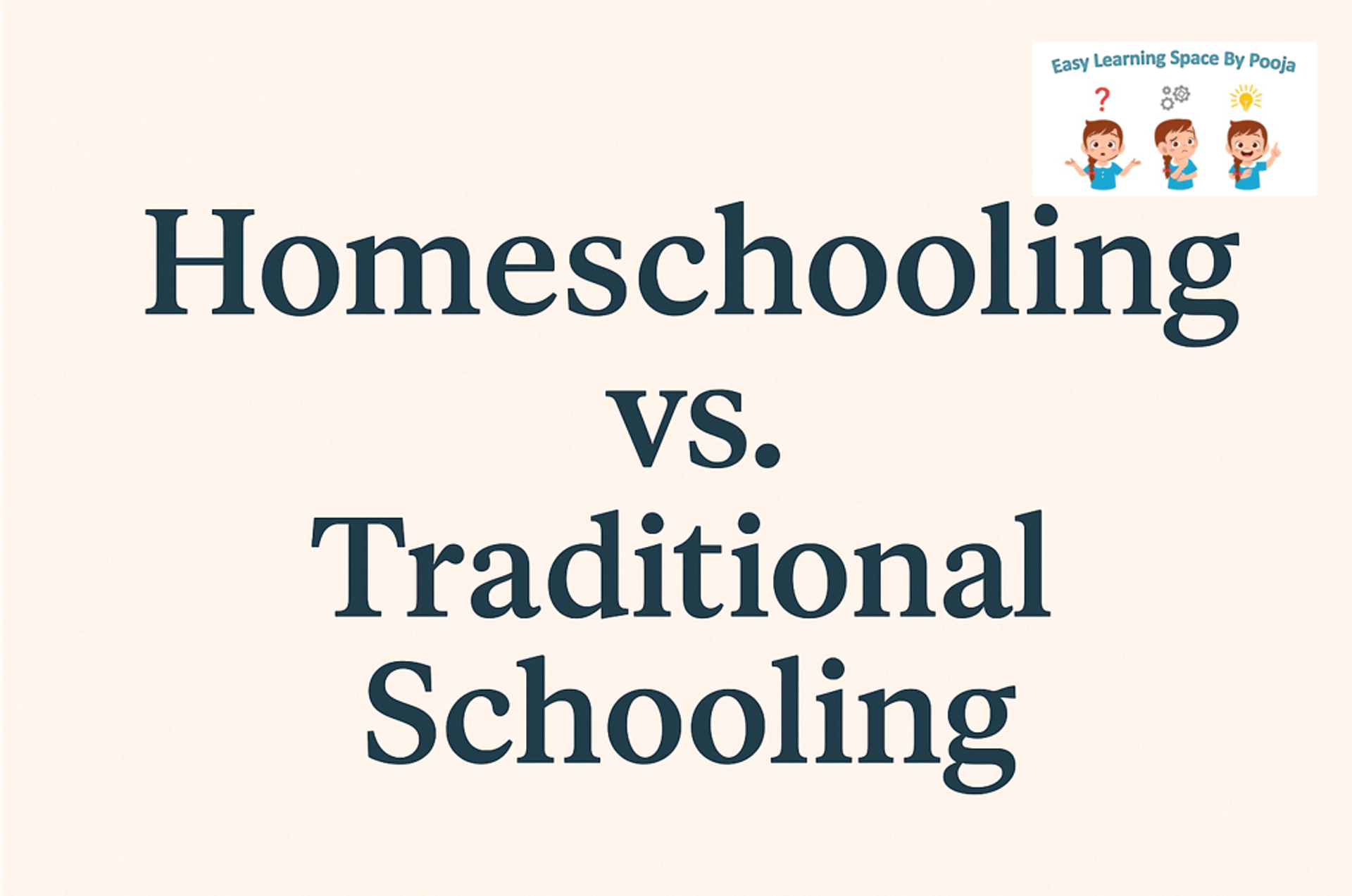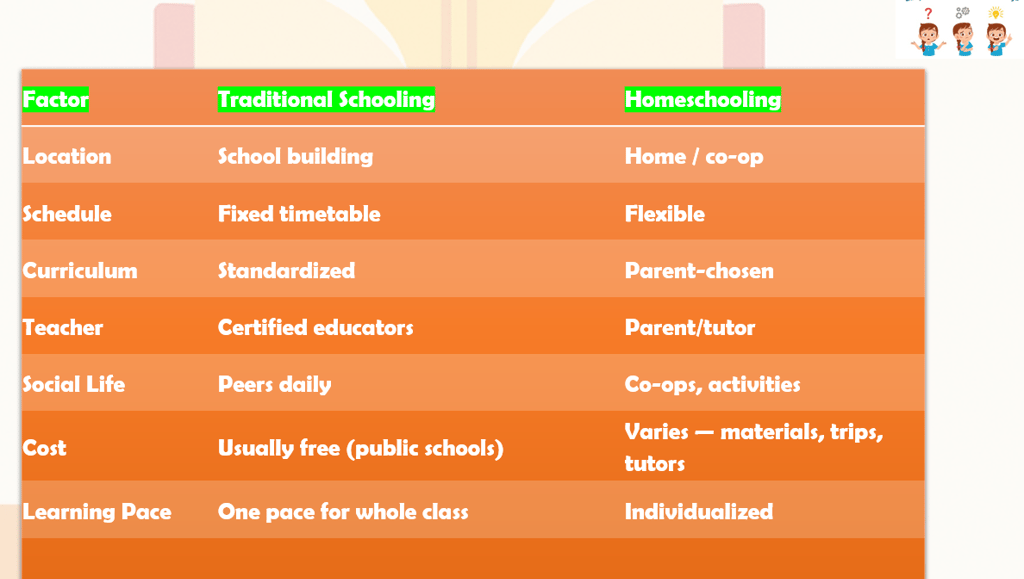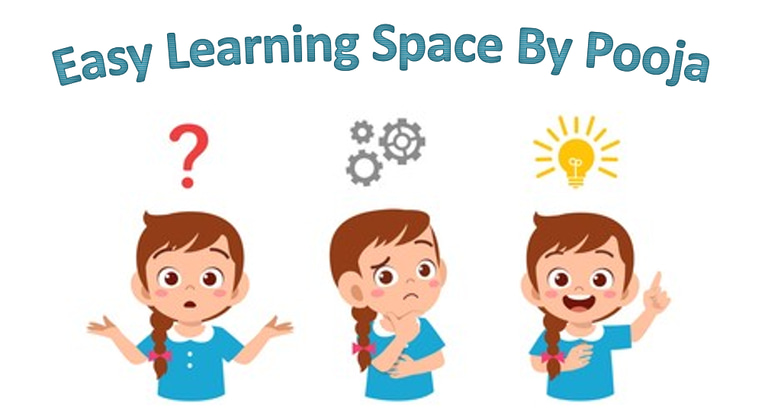Home schooling vs Traditional schooling, or Unschooling! Advantages and disadvantages! Understanding the best method for your child
Homeschooling vs traditional schooling pros and cons, what is unschooling? how to decide which method of schooling suits my child
Pooja
7/30/20254 min read

Home schooling vs Regular schooling, how are they different? A mother's and an educator's honest review
Homeschooling vs. Traditional Schooling: Which Is Right for Your Child in 2025?
More parents than ever are asking: Should I homeschool my child or stick with a traditional school?
It’s a big decision — and you’re not alone. Since the pandemic, millions of families have explored homeschooling as an alternative to standard classrooms. But is homeschooling really better? Or does traditional schooling still win for most kids? While these terminologies are commonly used among parents and educators in the metro cities, it is still hardly discussed in the tier 1and 2 cities. Hence it occurred to me to shed more light on this topic, to bring more awareness and give more clarity on this very curious topic.
In this guide, I’ll help you understand the key differences, the pros and cons of each option, and the questions to ask yourself before you decide. In my research for this blog, I have had the pleasure to speak to many parents and educators. It was an eye-opening experience for me especially since I have also been in this field for more than nine years now, but I was still not aware of so many aspects of education. Let us now try to understand from the most basic, concepts of Traditional schooling, home schooling and unschooling.
What Is Traditional Schooling?
Traditional schooling usually means sending your child to a public or private school, where they attend classes with peers in age-based grades. Teachers follow a set curriculum decided by local or national education boards.
Students have a fixed daily schedule — classes, breaks, activities, exams — and they interact with classmates and teachers face-to-face every day. Children have access to playgrounds, labs of different subjects, school library, computer labs, study materials and many such other physical facilities. It also exposes children to their social circle. Interacting with same age peer group who come from very different backgrounds and social structure, helps them to become more aware of their surroundings. Their socio-emotional skills develop that happen during their early childhood learning benefits them largely in the later stages of their life.
What Is Homeschooling?
Homeschooling means that parents take charge of their child’s education at home instead of sending them to a formal school. Parents can use ready-made curriculums, online programs, tutors, or teach lessons themselves.
Homeschooling laws and requirements vary by country and state. Some families follow a strict routine, while others prefer flexible, interest-led learning. Many home schoolers join local co-ops or learning groups, so kids still make friends and learn together. Children do not spend 6-7 hours at school, instead they learn the same concepts and subjects at home during 3-4 hours of time frame. The other hours are used to learn basic life skills like cooking, cleaning, stitching, banking, farming and many other such activities, which are very important in real life but are not taught in school.
The main purpose of home schooling is to keep children burden free and develop practical skills. It helps children to focus on the activities in which the child is more interested, allowing the child to devote more time in that particular activity.
What Is Unschooling?
Unschooling is an approach to education where children lead their own learning, following their interests rather than a set curriculum. Instead of formal lessons or tests, kids learn through life experiences, play, household tasks, hobbies, travel, reading — whatever naturally sparks their curiosity.
The philosophy is rooted in the belief that children are naturally curious and learn best when they’re motivated by genuine interest, not forced lessons. It is a child led, rather individual based learning.
How Is It Different from Homeschooling?
While homeschooling can follow a structured program at home (like using textbooks, lesson plans, or online classes), unschooling is intentionally unstructured. The parent acts more as a facilitator than a teacher — they help provide resources, answer questions, or connect kids to experiences, but they don’t push lessons or grades.
Key Principles
Child-led learning: Kids choose what, when, and how to learn.
Everyday learning: Real life is the classroom — cooking teaches math, gardening teaches science, conversation builds vocabulary.
No formal tests or grades: Progress is measured by real-world skills, curiosity, and personal growth.
Trust: Parents trust that kids will learn what they need when they’re ready.
Pros
Kids often develop deep knowledge in areas they truly love.
Less stress and pressure compared to rigid schooling.
Encourages independence, problem-solving, self-motivation.
Flexible — learning happens anywhere, anytime.
Cons
Critics worry about gaps in basic subjects (math, writing).
Harder to meet government requirements in places with strict homeschool laws.
May feel chaotic or too unstructured for some parents or kids.
Can be misunderstood by family or mainstream educators.
We all are different individuals with different thought processes. We may not agree with each other and sometimes we happily welcome suggestions given by others. How we lead, plan, shape and mould our lives is completely our choice. When you come across parents who are opting to be different than the conventional methods, it is my humble request do not judge them or create a perception about them. These choices are personal and let them be that way. All the parents today raising their children are more than aware. Also keep in mind, your children are constantly observing and absorbing you. Your behaviour, the way you speak about others, the way you interact (pass judgements) are subconsciously registered by them. If you have chosen to have children in your life, you have extra responsibility to set examples for them
To make this conversation more authentic, I have interviewed two of my acquittances who home schools her child. I have asked her five important questions (also very generic). Posting the transcript in my next blog stay tuned!
You can also check out my other articles
How to Help Kids Focus on Studies in a Digital World | Easy Learning Space by Pooja


Address
Pooja
Bangalore
Contacts
easylearningspacebypooja@gmail.com
Subscribe to our newsletter
This blog is for educational purpose only
All the information on this website – www.easylearningspace.com – is published in good faith and for general educational and informational purposes only. I aim to provide helpful teaching tips and resources, but I make no warranties about the completeness, reliability, and accuracy of this information.
Any action you take upon the information you find on this website is strictly at your own risk. I will not be liable for any losses
